Larry Elder talks faster than you can type. Faster, probably, than you can listen.
In a freewheeling interview with the Deseret News last week, words were flying from his mouth at nearly double the speed at which the average person speaks. The radio talk show host and former attorney could be an auctioneer, but that’s not the job he wants. He wants to be governor of California and now suddenly has a real shot at the office if incumbent Gov. Gavin Newsom, a Democrat, is recalled on Sept. 14.
That’s because if a majority of voters say Newsom should be recalled, the top vote-getter becomes governor, under California law. And right now, Elder is atop a field of 46 candidates that includes a college student, an actor, a hairstylist, a retired homicide detective and, most famously, Olympian-turned-trans-activist Caitlyn Jenner.
With a nationwide platform through his radio show, syndicated by Salem Media Group (the same company that syndicates Hugh Hewitt and Charlie Kirk), it’s Elder who has the advantage. And in recent weeks, as his candidacy draws more national attention, and it’s increasingly apparent he might really win, the knives are coming out.
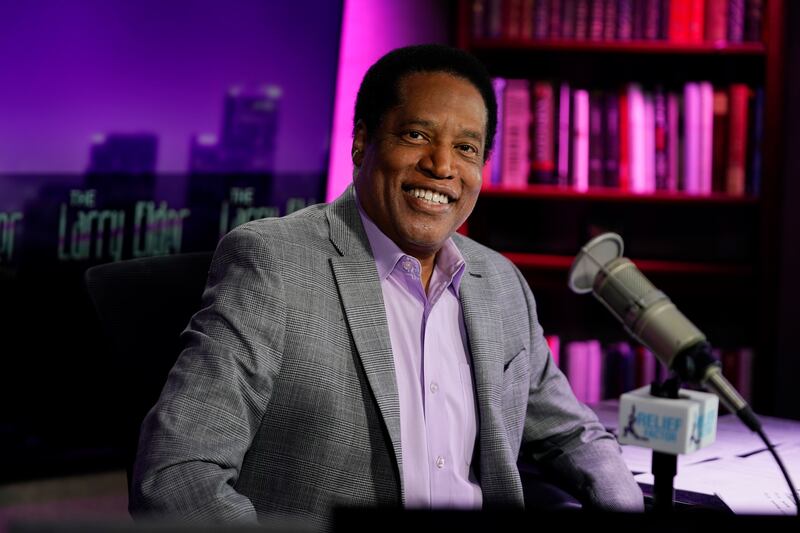
California newspapers have reported on a former girlfriend’s allegation that Elder threatened her with a gun six years ago. Elder denies the allegation, and prosecutors have said they will not pursue the case. Meanwhile, state officials are looking into whether the candidate has failed to disclose all sources of income as required by law, and Elder has come under fire for a range of things he has said in a broadcasting career spanning 27 years, including statements about women and the minimum wage.
Elder tweeted that Democrats are “desperate and slandering me,” and his communications director, Ying Ma, said, “A barrage of attacks has been launched at him in recent weeks for a very simple reason: The ruling class in Sacramento and its cronies are scared to death of losing power imminently.”
Democrats are unquestionably concerned. One columnist has suggested that the Democratic Party should scare voters to the polls in order to keep Newsom in office. Writing for the Los Angeles Times, Harold Meyerson noted that the race has national implications, in that the California governor could change the balance of power in the U.S. Senate if Sen. Dianne Feinstein, who is 88, retires, dies or becomes incapacitated during a new GOP governor’s term, since the state’s chief executive would appoint Feinstein’s replacement.
“The way to defeat the recall is for Democrats to show what would befall California under a Republican who governs in the spirit of Donald Trump,” wrote Meyerson, editor at large of the left-leaning magazine The American Prospect.
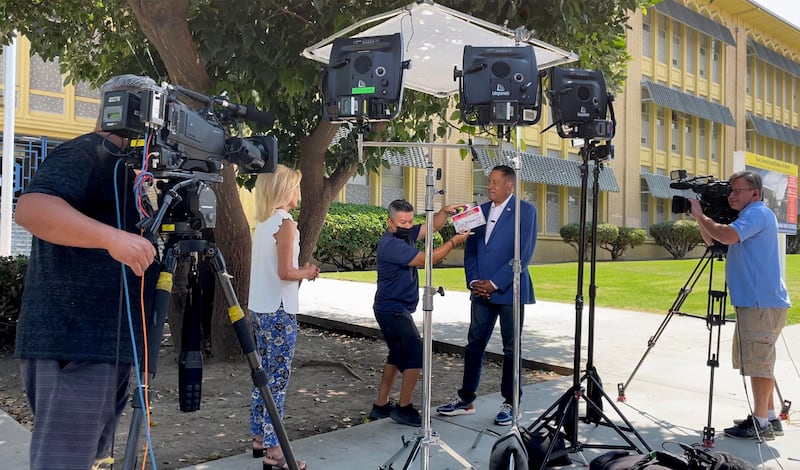
Elder, who is 69 and single, only mentioned former President Trump once in his conversation with the Deseret News, and that was to count Trump among his favorite presidents, after his hero Ronald Reagan.
It’s Reagan who inspires many of the positions that Elder holds, and whose career refutes a common criticism of Elder’s candidacy: that he doesn’t have the experience to be governor. “Ronald Reagan came out of Hollywood, for crying out loud,” Elder said. “Seemed a pretty decent two-term governor. A pretty decent two-term president.”
With some opponents leaning into Meyerson’s recommendation to use scare tactics to defeat Republicans, the articles denouncing Elder are becoming more more personal and strident, with the Los Angeles Times publishing a jarring headline that called him “the Black face of white supremacy.”
Two weeks from the election, however, Elder is still leading in the polls, with support of about 22% in a crowded field in which his closest competitors have 6.8% and 5.2%. And Elder is making plans, not only for finishing the year left on Newsom’s term, but also for winning another four-year term, like another recall-election winner, Arnold Schwarzenegger, did in 2003.
From guest to host
Despite critics’ claims that Elder doesn’t have the experience to run a state with the world’s fifth-largest economy, he has an educational pedigree that has prepared many a public servant for office: an undergraduate degree in political science from Brown University and a law degree from the University of Michigan. And for a while, it looked like law was his calling.
After finishing law school, Elder joined the Cleveland-based firm Squire, Sanders & Dempsey, where he worked for three years before starting a legal executive search company, Laurence A. Elder and Associates.
But one day he was a guest on a local radio show in Cleveland and impressed the program director so much that he was asked to fill in while the host was away the next week. Later, he similarly dazzled a visiting host from Los Angeles who went home and recommended Elder to his boss at KABC, ABC’s flagship West Coast station.
That host was Dennis Prager, now another Salem personality and founder of the website Prager University, a nonprofit that produces educational videos with a conservative point of view. Prager became a mentor to Elder, who sold his company and moved back to Los Angeles to focus on a broadcasting career.
Today, Elder is heard on about 300 stations nationwide. And in their 2021 listing of the “Heavy Hundred” of talk radio hosts, Talkers magazine rated him No. 18, ahead of big names such as Ben Shapiro, Dan Bongino and Buck Sexton. He’s even ahead of Prager.
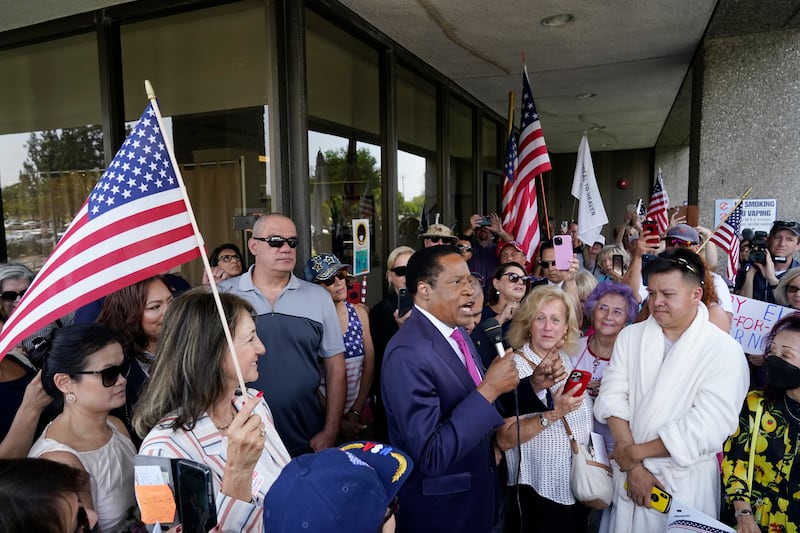
‘Normal was tense’
The son of parents who grew up in the South, Elder often credits his mother and father, Viola and Randolph Elder, for instilling his values, although they weren’t Republicans.
“My father came (to California) in 1945; he was a high school dropout who put his nickels and dimes together and started a little cafe,” Elder said. “My father always told my brothers and me, work hard, don’t whine, make sure that before you complain about somebody else that you’ve done everything you could to make the outcome the best outcome you could possibly have. My mother told me the same thing.
“If anybody had a reason to become angry about racism in America; it was my mother and father, both of whom were born in the Jim Crow South. And yet they told my brothers and me to be positive and work hard, and the sky’s the limit.”
But Elder’s relationship with his parents was complex and often troubled, as detailed in his 2012 book “Dear Father, Dear Son” (also published under the title “A Lot Like Me: A Father and Son’s Journey to Reconciliation.”)
In the book, Elder describes a father who whipped his young sons with a telephone cord for making a mess while they were taking a bath, a man who worked constantly, was not loving toward his wife and was easily provoked to rage. “Normal was tense,” Elder wrote. “Normal was not knowing whether you would say something that would set him off. And that could be anything. Normal was hate.”
But after a period of 10 years of not speaking, father and son reconciled after an eight-hour conversation in which Elder came to understand the childhood hardships that had helped to shape his dad.
In a June column, Elder wrote that he and his two brothers were fortunate to grow up in a home with married parents even though they did not always appreciate the “old-school discipline” of his father.
“He tolerated no excuses and always gave my brothers and me the following advice: ‘Hard work wins. You get out of life what you put into it. You cannot control the outcome, but you are 100% in control of the effort. Before you complain about what somebody said or did to you, go to the nearest mirror and ask yourself, “What could I have done to change the outcome?” And, no matter how hard you work, how good you are, bad things will happen. How you respond to those bad things will tell your mother and me if we raised a man.’”
The memoir was well-received and not as controversial as Elder’s book “The Ten Things You Can’t Say in America,” which was published in 2000 and is dedicated to his parents. Among the 10 things: Blacks are more racist than whites, and America’s biggest problem is not crime, racism or bad schools, but children born out of wedlock.
Asked if his views have changed in the ensuing decade, Elder thought for a moment, and then said no. “If anything, I’ve doubled down on the things that I said.”
When Franklin met Friedman
Elder’s approach to life seems much like a marriage of the sayings of founding father Ben Franklin and economist Milton Friedman, in a rapid-fire delivery spiced with humor. “Commonsensical” is a word he uses frequently when describing his positions. What Elder considers common sense, however — including his opposition to abortion rights and the minimum wage — his Democratic opponents consider right-wing extremism.
“Their hair is on fire” over those issues, he said.
Factor in his opposition to critical race theory and reparations to Black Americans, and his denunciation of the idea that America still experiences systemic racism, and Elder is at odds with much of Black America, leading one Los Angeles Times columnist to argue that a Gov. Elder would make life harder for Black and brown Californians.
Elder, however, contends that success begins with education, and he promotes a school-choice program that he says would dramatically improve the chances of minorities.
“Who wants choice in schools?” he says. “Black and brown parents do. But we’re spending an average of $15,000 per student here in California, and only half of the third grade kids in California can read at grade level proficiency, and 75% of Black boys cannot read at state levels of proficiency.”
Elder wants California to give parents $15,000 in an education account that they can use each year for private schools, parochial or religious schools or even home schooling.
He also wants a larger discussion about the numbers of children growing up in homes without married parents and how that contributes to poor outcomes for children.
He notes that 6.5% of California’s population is Black, while Blacks make up 40% of the state’s homeless population.
“Many of the problems we’re talking about, whether it’s crime or homelessness, stem from the breakdown of the family,” he said. “In 1965, when Lyndon Johnson lost his so-called war on poverty, 25% of Black kids entered the world without a father married to the mother.
“Now 25% of white kids enter the world without a father married to the mother. Almost half of Hispanic kids do, and nearly 70% of Black kids enter the world without a father married to the mother. What we’ve done is, we’ve incentivized women to marry the government and we’ve incentivized men to abandon their financial and moral responsibilities. We need to have a conversation about that.”
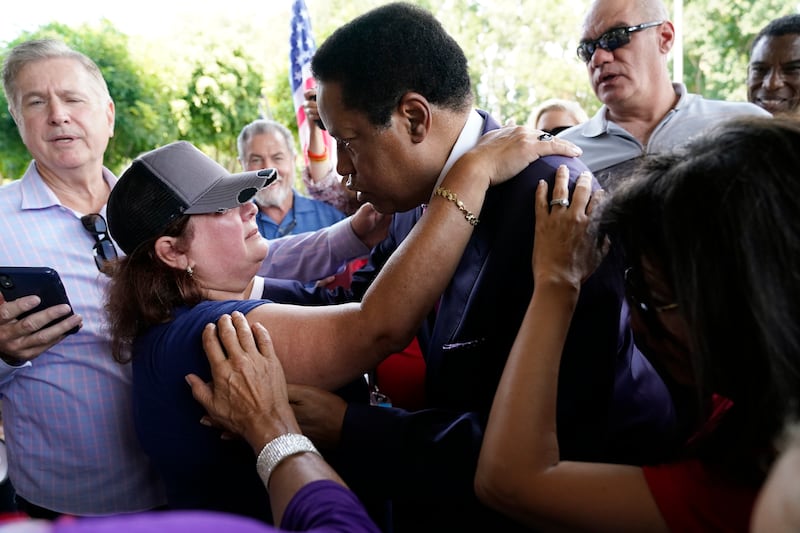
Newspaper vendetta?
The conversation taking place in many of California’s media outlets, however, is about recent salacious allegations regarding Elder’s marijuana use and his former fiance and radio producer’s charge that he threatened her with a gun when their relationship was deteriorating. Elder said he “categorically denies” that he has ever brandished a gun, “loaded or unloaded” at anyone and says that this and other negative reporting is part of long-standing animosity toward him from the state’s leading newspapers.
He’s written six books, some of which have made The New York Times and Los Angeles Times bestseller lists, and he says the Los Angeles Times, his hometown newspaper, has never reviewed any of them. “I’ve been ignored completely my whole career by the Los Angeles Times, even though I’m from Los Angeles, and by any measure, I should be a success story. ... Because I refute their narrative. Their narrative is that racism remains a major problem in America, that all Black people are suppressed.
“Just the other day they said I was the black face of white supremacy, quote, unquote. Honestly. Why? Because Larry Elder does not believe that systemic racism is holding people back.
“I don’t believe in systemic racism. Whenever I ask people to give me an example, they say the police. Well, study after study, cops are more hesitant, more reluctant, to pull the trigger on a Black suspect than a white suspect,” he said. “It’s called tacit policing, or sometimes, it’s called the Ferguson effect, or the George Floyd effect; cops are just responding to radio calls as opposed to getting out and trying to be proactive and stop crime before it happens. And what happens? Crime goes up and the very people that the left claims they care about, Black and brown people, are disproportionately affected.”
That led him into a talk radio-style monologue on crime and homelessness, both of which intersected with California’s controversial Proposition 47, which reduced penalties for some property crimes, and which some people believe has resulted in higher rates of crime.
“Then you have this ridiculous defund the police movement. In Oakland just the other day, Barbara Boxer got mugged; her cellphone was taken. The Oakland police chief just days earlier had complained about money being diverted from his police department. And a few months before that, a homeless, mentally ill man attacked Gavin Newsom, the governor, and he had his security detail with him. Had he not had his security detail with him, who knows what would have happened? How many of us can afford to have security detail?”
‘I don’t have horns’
Although the Los Angeles Times has reported that state officials are investigating whether Elder underreported his income on campaign disclosures, he has reported that Laurence A. Elder and Associates, of which he is the sole owner, is worth between $100,000 and $1 million.
“His exact wealth is difficult to determine because the state requires disclosure in broad dollar ranges,” the newspaper report said. Elder told the Deseret News that a documentary he made last year called “Uncle Tom” (subtitled “An Oral History of the Black Conservative”) had made more money than all five of the Academy Awards’ five nominees for best documentary last year. And in 2019, the Los Angeles Times reported that his “showplace” home overlooking the Hollywood Hills was for sale for $5.2 million.
The average price of a single-family home in California is about $800,000, which is one of the reasons people are leaving the state, Elder said.
“And there’s a new study that just came out by the Hoover Institution that shows the rate at which businesses are leaving California, in the first six months of this year, is double the rate at which they’ve been leaving the past three years. And again, for all the things that I mentioned.”
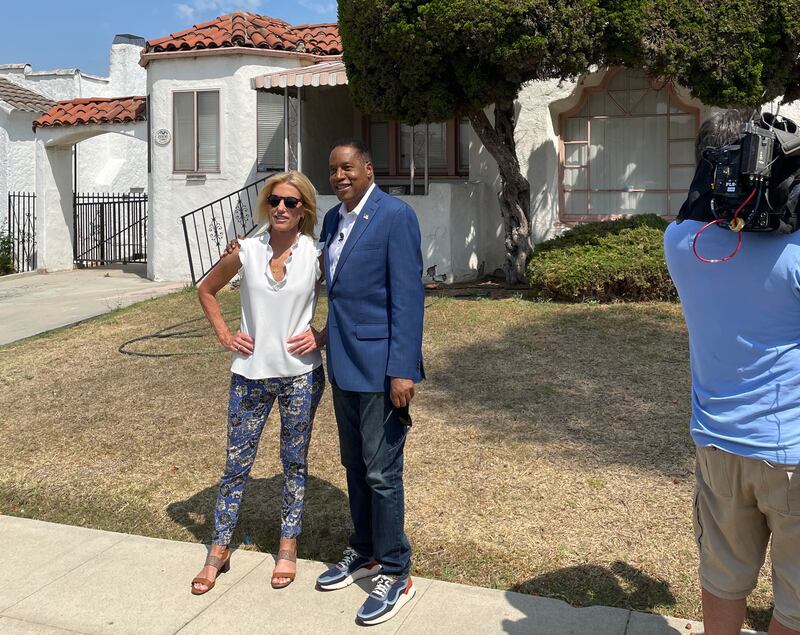
Experienced politicians created the California that Californians want to leave, Elder said.
“Look at my opponent, Gavin Newsom. He’s got a boatload of experience. He was a two-term mayor of San Francisco; for eight years, he was lieutenant governor, and he had all that time to plan what he would do as governor. And for the last two years he’s been governor, and 1.7 million people have signed a petition to get rid of this guy.”
Elder is already talking like a man with a Cabinet to hire. He says he’s in touch with former Gov. Pete Wilson and is lining up advisers, to include Wilson’s former attorney, Daniel Kolkey, and Steven Greenhut, a resident senior fellow at the conservative think tank R Street Institute and the author of the 2020 book “Winning the Water Wars.”
In his first days in office, which could be as soon as October if he wins, Elder said he will make emergency declarations on homelessness and water that will allow him to enlist the public sector’s help and jump-start projects that have been stalled. For all the outrage about his position on the minimum wage — he thinks it should be zero — that doesn’t make his to-do list. “I’m going to concentrate on the budget and all the other things I’ve mentioned,” he said.
He hopes to accomplish enough a year in office that Californians will reelect him in 2022, having seen that Elder — and perhaps all Republicans? — aren’t as scary as they’ve been made out to be.
“I’m going to have the opportunity to take over, probably sometime in October. I’ll run again in late 2022, and between October and 2022, they’ll find out I don’t have horns, I don’t have a tail. I’m commonsensical.
“I’m going to push for choice in schools, I’m going to do something about the homelessness problem, I’m going to do something about the cost of living. And then surprise, surprise, things are going to get better for Californians, and a majority of Californians are going to pull that lever for me for a full four years.”
—-
A previous version of this article said that Ying Ma is Larry Elder’s press secretary. She is the campaign’s communications director.

